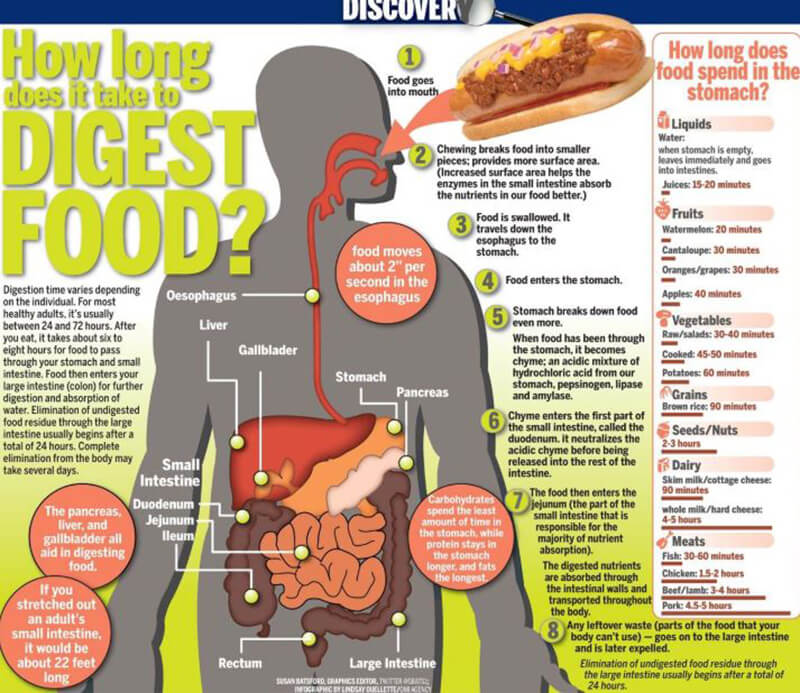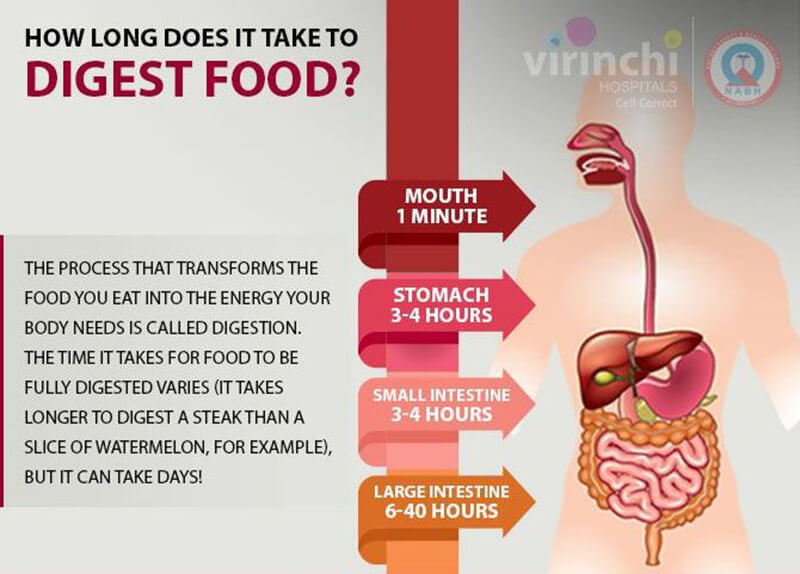How Long Does It Take For Food To Digest
Food requires 24 to 72 hours to proceed throughout your digestive tract. The precise time depends upon the quantity and kinds.
The speed can also be based on variables such as your sex and also if you have any problems that can slow down or accelerate the process.
Through your tract, food travels In the beginning. Through your stomach, small intestine, and large intestine, the food has transferred its way In 6 to 8 hours.
While it’s broken down once on your large intestine, the contents of your meal may sit for over a day.
Your digestion speed is based on what you have consumed. Fish and meat may take to digest. The proteins and fats that they contain are molecules which require to pull.
By comparison, produce, which are full of fiber, can proceed throughout your system day. In reality, these high fiber foods help your track run in general.
The fastest are processed, sugary junk foods such as candy bars. Your body rips in a matter of hours them through leaving you hungry.
Digestion is the process by which food is broken down by your body and pulls out.
Your digestive system consists of five components:
That is exactly what occurs when meals are digested by you:
Spit is released by glands in the mouth as you chew. This liquid comprises. The outcome is a mass known as a bolus that is easier to consume.
If you swallow, the food goes down your stomach — the pipe which connects your mouth. Agate known as the lower esophageal sphincter opens to allow the food to move.
The food breaks down. This produces a combination of juices and partly digested food. This mix moves on to a small intestine.
Into the mixture, your liver and pancreas contribute their digestive juices On your small intestine.
Bile from your stomach dissolves fat. Other nutrients vitamins, and water transfer in your bloodstream through the walls of the intestine. Moves on to an intestine.
The large intestine absorbs leftover nutrients and any residual water. The remainder gets waste.
Till you are all set to have a bowel movement, your anus shops stool.

Potential gastrointestinal problems
Conditions can disrupt digestion and also leave you with a few side effects such as heartburn, gas, constipation, or nausea. Listed below are a couple:
This permits acid to back up into your esophagus out of the stomach. The symptom is heartburn. The feces is difficult and firm to pass, Whenever you do proceed. Constipation causes symptoms such as pain.
- Diverticulosis creates little pouches on your intestines. Itself does not cause symptoms, however when feces becomes trapped in the components, infection and inflammation can occur. This phenomenon is called diverticulitis, and symptoms include loose stools, abdominal pain, and fever. These conditions produce chronic inflammation within your intestines which may result in pain, ulcers, bloody diarrhea, weight loss, malnutrition, and raise the risk of colon cancer.
- Lactose intolerance signifies that the body lacks the enzyme required to break down the sugar in milk products. If you consume milk, you get symptoms such as stomach ulcers, gas, and bloating.
Strategies for Improved digestion
To keep food moving through your tract and avoid problems like nausea and constipation, try these hints:
Fruits, vegetables, and whole grains are rich sources of fiber. Fiber helps food move completely and more easily.
StudiesTrusted Source reveals red meat produces chemicals that are associated with heart disease.
Add probiotics into your daily diet
These bacteria help crowd out the bugs on your digestive tract. You’ll locate them in nutritional supplements, and in foods such as yogurt and kefir.
Exercise everyday
Taking a walk may prevent bloating and gas. Exercise keeps your weight in check, which reduces your threat to specific cancers and other ailments of the digestive tract.
Get Lots of sleep
Too little sleep is connected to obesity, which may lead to problems with your digestive tract.
Manage anxiety
Ailments that are digestive can aggravate. Stress-relieving techniques like yoga and meditation help calm your mind.
You may not think about your tract on a daily basis. Yet you will understand when it is not functioning by symptoms such as bloating, gas, constipation, and nausea.
See what you eat and remain busy to keep your digestive tract moving and feel you’re very best.
